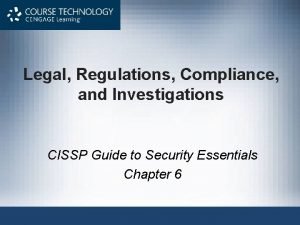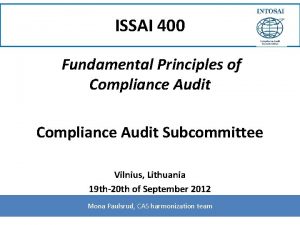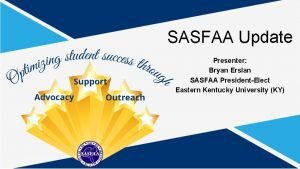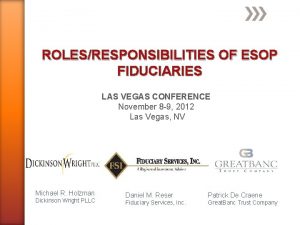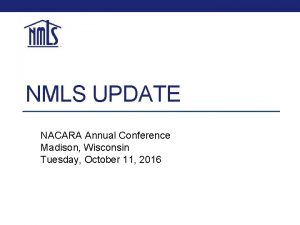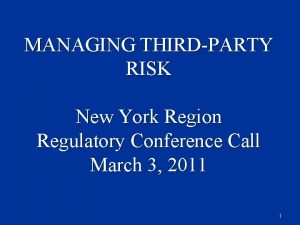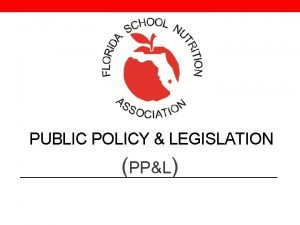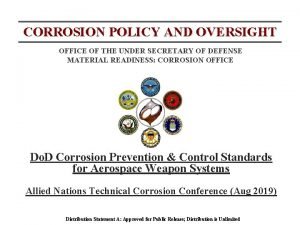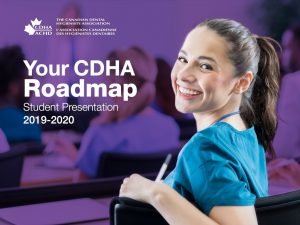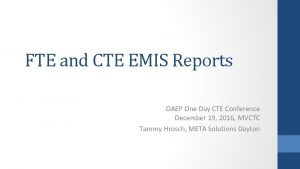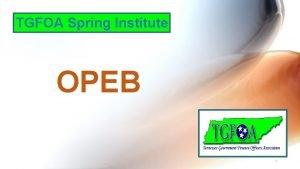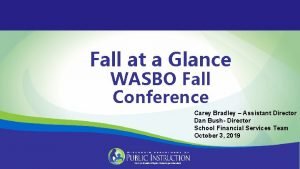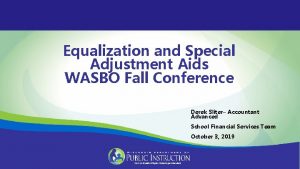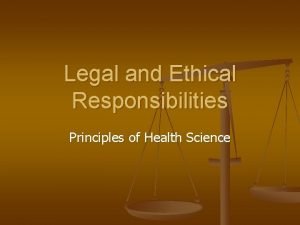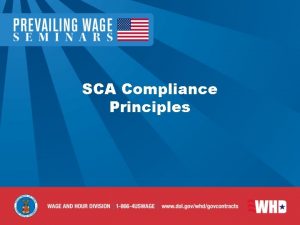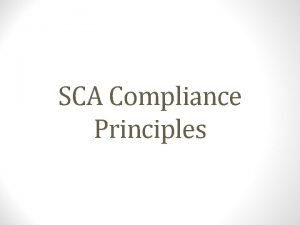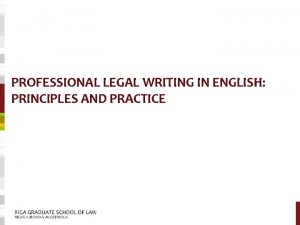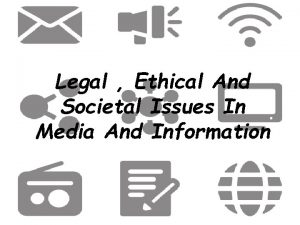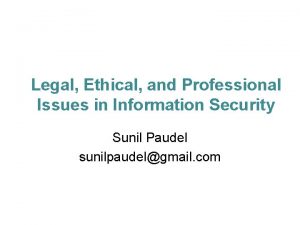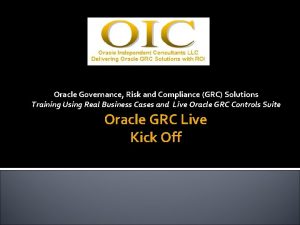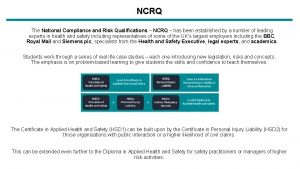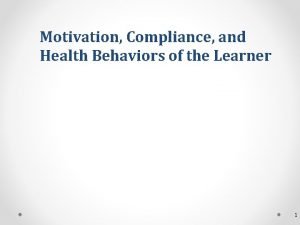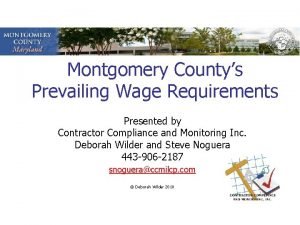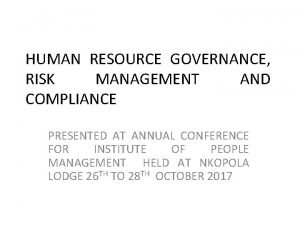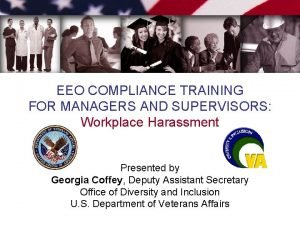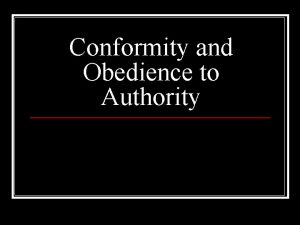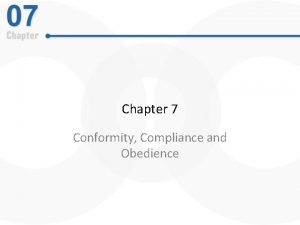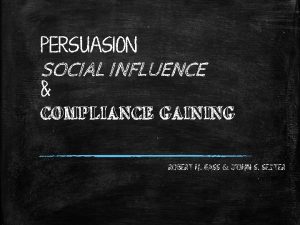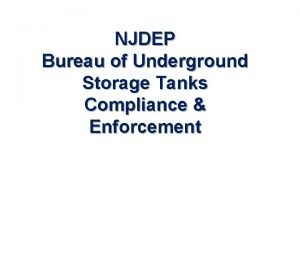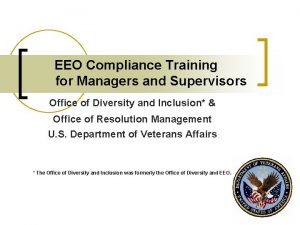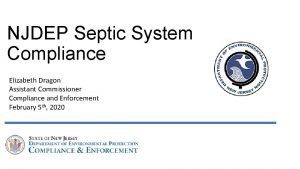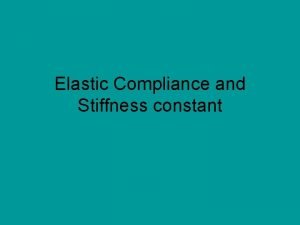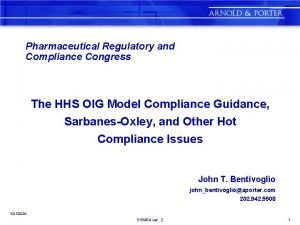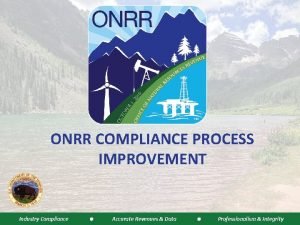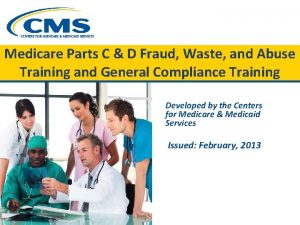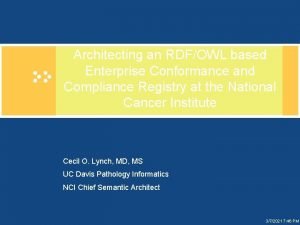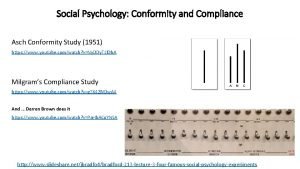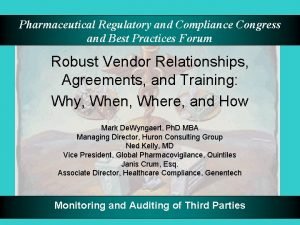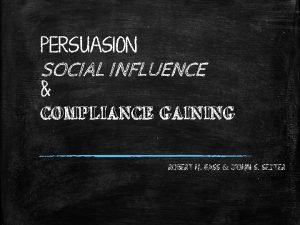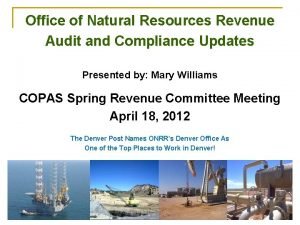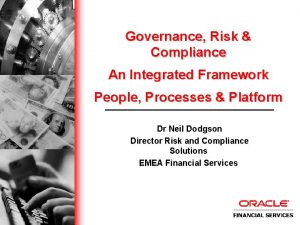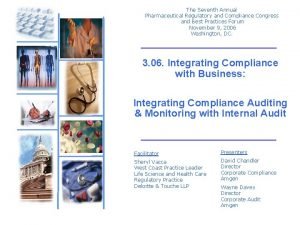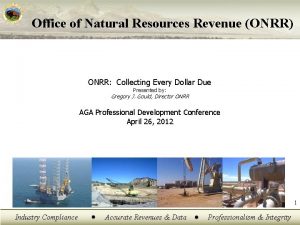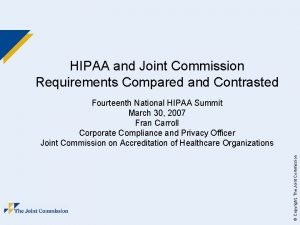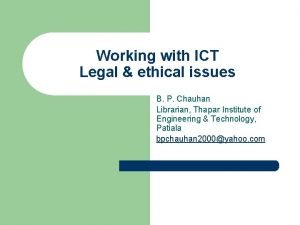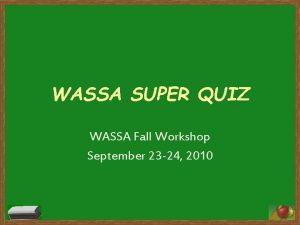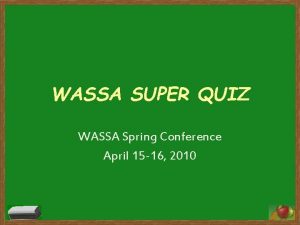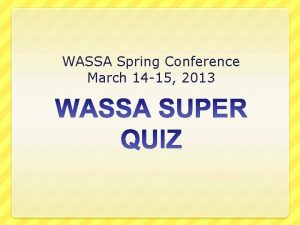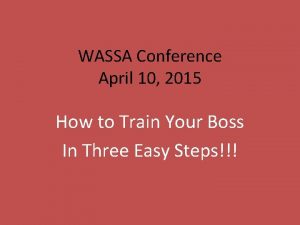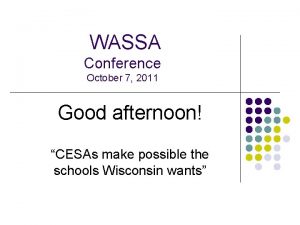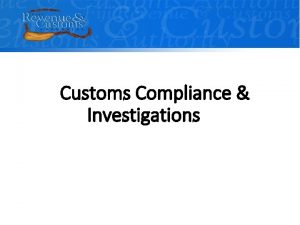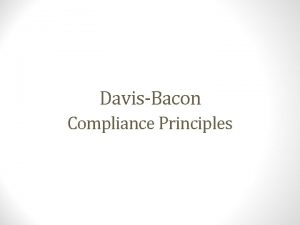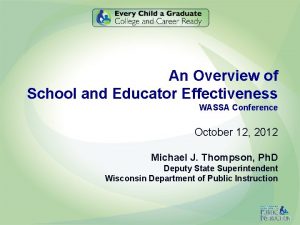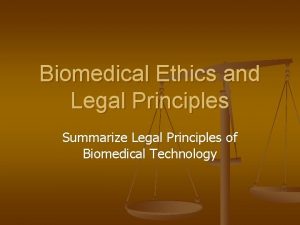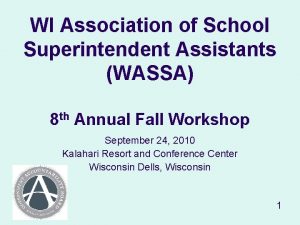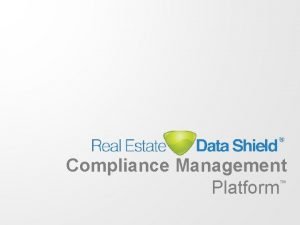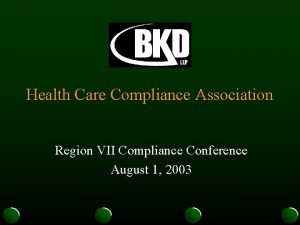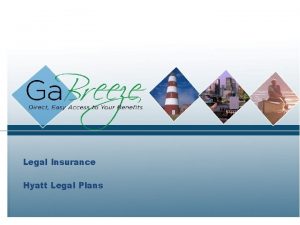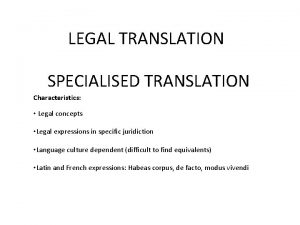2019 WASSA Fall Conference Compliance Legal Principles and















![Administrator Contracts, con’t. • “No [administrator covered by Wis. Stat. § 118. 24] may Administrator Contracts, con’t. • “No [administrator covered by Wis. Stat. § 118. 24] may](https://slidetodoc.com/presentation_image_h2/4ed71482d28bdc98747a3bc666278d0f/image-16.jpg)

















































- Slides: 65

2019 WASSA Fall Conference Compliance: Legal Principles and Board Policies Require the District to Do What? MICHAEL J. JULKA | OCTOBER 10, 2019

Compliance So many of the “teachable moments” that arise out of the review of statutes, regulations, and court decisions dictate what can’t be done, or give direction with regard to interpretations, strategies, or techniques for future conduct. However, there are legal sources applicable to school districts, school boards, and District Administrators which simply mandate compliance with specific directives. In addition, board policies and administrative guidelines often include such mandates, particularly directed at the District Administrator “or his/her designee. ” This presentation will highlight some of the most important compliance mandates of which WASSA members should be aware with the objective of creating an “auditing resource. ”

Policy Compliance

Adoption Of Policies • Particularly when a district is utilizing a policy service, school superintendent assistants are often the first to review proposed policies and revisions. • Board members and administrators should be comfortable with substantive provisions and procedures that extend beyond legal obligations. • The school superintendent’s assistant can be a valuable source for ensuring that policies are consistent. For example, one policy might say “professional staff” and another say “teachers. ” • Policies often contain particular obligations with which a district administrator or designee must comply, such as, “The District Administrator shall create administrative guidelines regarding this policy. ”

Adoption Of Policies, cont. • Examples of Policy Mandates: • “All official communications, policies, and directives of the Board of staff interest and concern to the staff will be communicated through the District Administrator, who shall also keep staff members fully informed of issues, concerns, and actions of the Board. ” • “The District Administrator, or in his/her absence, the District Secretary, are designated as the District Records Officer ("DRO") and shall be the legal custodians of records for the District. ” • “Whenever seclusion or physical restraint is used with or on a student, the Principal or his/her designee shall notify the student's parent or guardian as soon as practicable but no later than one (1) business day after the incident. ” • “The [personnel] records will be reviewed in the presence of the District Administrator or a designee. ” • “The Superintendent shall provide appropriate information to all members of the School District community related to the implementation of [the employee anti‐harassment policy] and shall provide training for District staff at such times as the Board in consultation with the Superintendent determines is necessary or appropriate. ” • Assistants should be aware of mandates that place responsibilities on assistants and secretaries either explicitly or through delegation. In addition, assistants should remind administrators of mandates created by policies or administrative guidance.

Adoption Of Policies, cont. Examples where the law requires the Board to adopt a policy: • Districts participating in a federal food program (such as the federal School Lunch Program) shall establish a local school wellness policy that meets legal requirements. 42 U. S. C. § 1758 b. • Districts that use E‐Rate discounts must have an internet safety policy. 47 U. S. C. § 254(h)(5)(B)‐(C). • Districts must have a policy on how the school board will fill vacancies on the school board if the board does not fill the vacancy by appointment within 60 days of the date on which the vacancy first exists. Wis. Stat. § 120. 12(28). • Districts must have a policy on student bullying. Wis. Stat. § 118. 46(2). • Districts must have a policy that allows the use of reasonable and necessary force in contrast to prohibited corporal punishment. Wis. Stat. § 118. 31(4).

Labor Compliance

Collective Bargaining Issues • Duty to bargain “in good faith” applies to (and is restricted to) the amount of total base wage increase, as well as the distribution thereof. • If a bargaining unit exits, notices of teacher contract renewal or issuance of individual teacher contracts must provide that the base wage is subject to amendment by a subsequent collective bargaining agreement.

Statutory Notices Regarding Collective Bargaining • Notification of the WERC. • Notice to the public and news media of the re‐opening of collective bargaining that complies with the Open Meetings Law. • Presentation of initial bargaining proposals, in writing, along with supporting rationale, at a noticed open meeting. • Consideration of tentative agreement and final ratification of tentative agreement must be at a noticed open session of the School Board.

Employment Contract Compliance

Who Receives an Employment Contract? • Wis. Stat. § 118. 21(1) states, “The school board shall contract in writing with qualified teachers. ” • Wis. Stat. § 118. 24(1) states, “A school board may employ a school district administrator, a business manager and school principals and assistants to such persons. The term of each employment contract may not exceed 2 years. A contract for a term of 2 years may provide for one or more extensions of one year each. ” • Wis. Stat. § 118. 24(8) states, “Personnel administrators and supervisors, curriculum administrators and assistants to such administrative personnel, when employed by the school board of any school district to perform administrative duties only, may be employed for a term that does not exceed 2 years. A contract for a term of 2 years may provide for one or more extensions of one year each. ”

Support Staff Employment • All drivers of motor vehicles owned by the school district and used for the transportation of pupils shall be under written contract with the school board of the district. Wis. Stat. § 121. 52(2)(a). The written contract may provide for at‐will status. • Letters of employment, if utilized, should make clear that their issuance does not negate the at‐will status of the support staff employee. Letters of employment for a fixed term (e. g. , July 1 ‐ June 30, or the 2019‐ 2020 school year) have been interpreted as negating at‐will status and as creating an expectation of employment which requires procedural due process if termination is under consideration.

Support Staff Employment, con’t. • Notices of reasonable assurance must be issued to school year employees prior to the end of a school year in order to avoid the employee being eligible for unemployment compensation over the summer months. • Generally, there is an 80% wage and benefit standard that must be met or exceeded to constitute an assurance of a reasonably similar position in the subsequent school year in order to qualify as a bona fide notice of reasonable assurance.

Teacher Contracts • Individual teacher contracts may be individualized to the particular teacher, including liquidated damages, supplemental pay, and other contract terms. • Base wages for teachers may also be individualized if agreed upon during collective bargaining or if included in the board’s final offer at impasse. • Any such individualization, however, may not be discriminatory on the basis of a protected class(es). • Wis. Stat. § 118. 22 procedures and timelines are only applicable to full‐time teacher contracts. Full‐time vs. part‐time is not governed by DPI rule. • No teacher may be employed or dismissed except by a majority vote of the full membership of the board. Wis. Stat. § 118. 22(2).

Administrator Contracts • The term may be for any period of time up to a maximum of two years. A contract with a term of two years may provide for one or more extensions of one year each. • Contract renewal v. contract extension. • The second of two, two‐year contracts was void and unenforceable. Klaus v. Eau Claire Area School District (2010).
![Administrator Contracts cont No administrator covered by Wis Stat 118 24 may Administrator Contracts, con’t. • “No [administrator covered by Wis. Stat. § 118. 24] may](https://slidetodoc.com/presentation_image_h2/4ed71482d28bdc98747a3bc666278d0f/image-16.jpg)
Administrator Contracts, con’t. • “No [administrator covered by Wis. Stat. § 118. 24] may be employed or dismissed except by a majority vote of the full membership of the school board. ” • “Prior to giving notice of refusal to renew the contract of any [administrator covered by Wis. Stat. § 118. 24], the employing board shall give such person preliminary notice in writing by registered mail at least 5 months prior to the expiration of such contract that the board is considering nonrenewal of the contract…”

Hiring Compliance

Background Checks • If a district chooses to conduct a pre‐employment criminal background check, the district may want to obtain authorization for the criminal background check from all applicants, but is not always required to do so. • No notice to an applicant or current employee is necessary prior to a district doing background checks of applicants or current employees on its own. o Such a background check might include checking CCAP for records. o Note that CCAP is not completely accurate and is limited only to Wisconsin state offenses. • However, if a district engages a third party that regularly conducts background checks to perform background checks for the district, these background checks will likely constitute credit reports that trigger the Fair Credit Reporting Act.

Fair Credit Reporting Act FCRA requirements include: A clear and conspicuous disclosure to the applicant before requesting the credit report, in a document consisting solely of that disclosure, that: • A consumer report may be obtained for employment purposes; • That the consumer has authorized in writing the procurement of the report by the employer; and, • That before an adverse action is taken, the applicant or employee will be provided with a copy of the report, the address and phone of the credit bureau, and a copy of “A Summary of Consumers Rights” under the FCRA.

Fair Credit Reporting Act, con’t. Before obtaining a credit report from a credit reporting agency, the employer must certify to the credit reporting agency that: • The consumer has been informed that an credit report may be obtained for employment purposes; • The consumer has authorized the procurement of a credit report; • The consumer has been informed about the procedures to be taken in case an adverse action is to be taken based in whole or in part on the credit report; and, • The information being obtained will not be used in violation of any federal or state equal opportunity law or regulation.

Fair Credit Reporting Act, con’t. • Before taking an “adverse action”, the employer must issue a statement advising the applicant that an adverse action may be taken based in whole or in part on the credit report obtained, and enclosing a copy of that report, and a copy of a prescribed Summary of Rights issued by the Federal Trade Commission. • When the adverse action is taken, the employer must issue a notice which must include: o The name, address, and telephone number of the agency/individual used; o A statement that the agency/individual was not responsible for taking the adverse action and therefore, cannot explain it; and, o A notice that the applicant or employee may dispute the accuracy or completeness of any information furnished by the agency/individual, and that the applicant or employee has the right to an additional free credit report if requested within 60 days of receipt of the Adverse Action Notice.

Wage and Hour Compliance

Frequency of Wage/Salary Payments • All salary/wages must be paid within 31 days of earning. • District cannot require employees to receive payment over 12 months when such employees render services only during the months when students are in attendance. • Therefore, the default approach for Districts should be to make payments to these employees over the 9 months when students are in attendance. • Exception: Employees who voluntarily request payment over a 12‐month period, if the District allows payment over a 12‐month period.

FLSA Classification • FLSA Exemptions. In order to be exempt from the Act’s minimum wage and overtime requirements, an employer must be able to show that the employee meets the job duties associated with a specific exemption. • These exemptions are identified by different categories, including bona fide executive, administrative, academic administrative, and professional employees. • The FLSA regulations define the requirements for each of these exemptions. In general, each of these employee exemptions includes three basic requirements: o a salary basis requirement; o a salary level requirement; [This is the only criterion affected by new regulations which go into effect on January 1, 2020; the new minimum salary threshold will be $684 per week (annualized to $35, 568 per year)] o a primary duty requirement.

FLSA Classification, con’t. • Teachers are exempt from the minimum salary requirement. Teachers are defined as those who are engaged in teaching, tutoring, instructing or lecturing in the activity of imparting knowledge. • Academic administrative employees, such as superintendents, principals and vice‐ principals, are exempt from the minimum salary requirement but must be paid on a salary basis equal to the entrance salary for teachers in the district. • Other district employees, such as social workers, physical therapists, and psychologists may not qualify as teachers or academic administrative employees. These employees could likely be exempt from overtime pay as “professional employees. ” However, professional employees must be paid the minimum weekly salary level per week to be exempt from overtime pay. Guidance counselors may qualify as teachers in some instances, depending on the exact duties of the counselor. • Employees who are in multiple positions present special challenges (e. g. , teacher/coaches, support staff/coaches, paraprofessionals/event workers, paraprofessionals/after‐school programs, etc. ).

FLSA Compliance, con’t. Coaches • Exempt employees coaching. o Generally no issues because primary duty is as an exempt employee. o Outside employees coaching. o New DOL Opinion Letter holding that as long as they are not employed in any other capacity coaches are teachers and not bound by minimum wage and overtime requirements. o They are also not subject to minimum salary requirements, like a teacher, so the problem of making sure they do not work too many hours has now gone away.

FLSA Compliance, con’t. Coaches • Non‐exempt employees coaching. o Generally must combine both jobs and pay OT for all work over 40 hours. o This creates an issue of paying OT and figuring out the correct rate o Volunteer issue. Some districts allow these individuals to volunteer, creating challenges. • Non‐regular employees coaching. o Exempt as “teachers. ” o No minimum salary requirement.

FLSA Compliance, cont. • A bona fide volunteer: o Performs hours of service for a public agency for civic, charitable or humanitarian reason, without promise, expectation, or receipt of compensation for service rendered; o Offers his or her services freely and without pressure or coercion, direct or implied, from an employer; and o Does not perform the same type of service for the public agency as an employee as those for which they propose to volunteer. • Payments to volunteers. o Bona fide volunteers may be paid expenses, reasonable benefits, a nominal fee, or any combination thereof for their service without losing their status as volunteers. o Paying up to 20% of what you would normally pay for the position has been held to be permissible. See FLSA Opinion Letter 2005 -51 (November 10, 2005).

Governor Evers’ Taskforce on Worker Misclassification • On April 15, 2019, Governor Evers signed Executive Order #20, creating a new Joint Enforcement Task Force on Payroll Fraud and Worker Misclassification regarding employee versus independent contractor status and exempt versus non‐exempt overtime status. Since 2016, the Department of Workforce Development has found under‐reported gross wages of almost $70 million and assessed approximately $1. 8 million in unemployment insurance taxes, interest, and penalties due to employers misclassifying workers as independent contractors when they are employees or being exempt from overtime payments when they are actually non‐exempt. • The new task force will be staffed by DWD members and will lead increased coordination and investigative efforts among several state departments to ensure employers are correctly classifying employees. Further detail on the task force has not been released, but this serves as a signal that a worker’s classification as an independent contractor or exempt status from overtime may come under stricter scrutiny by DWD in the future.

Training and Reporting Compliance

Mandatory Reporting of School Violence • Any school employee must report if he or she believes in good faith, based on a threat made by an individual seen in the course of professional duties regarding violence in or targeted at a school, that there is a serious and imminent threat to the health or safety of a student or school employee or the public. • This report must be immediately made by telephone or personally to a law enforcement agency and must include the facts and circumstances contributing to the belief that there is a serious and imminent threat to the health or safety of a student or school employee or the public. • Any person or institution participating in good faith in the making of a report under this law shall have immunity from any liability, civil or criminal, that results by reason of the action. • Whoever intentionally violates this law by failure to report as required may be fined not more than $1, 000 or imprisoned not more than 6 months or both. • Each school board shall require every employee of the school district governed by the school board to receive training provided by DPI in the law governing the reporting of a threat of violence. A school district employee shall receive that training within the first 6 months after commencing employment with the school district and at least once every 5 years after that initial training.

Child Abuse and Neglect Reporting • Any school employee who has reasonable cause to suspect that a child seen by the person in the course of professional duties has been abused or neglected or who has reason to believe that a child seen by the person in the course of professional duties has been threatened with abuse or neglect and that abuse or neglect of the child will occur shall report child abuse. • The report must be made to the county social or human services department.

Bloodborne Pathogens Training • An educational program on bloodborne pathogen training is required of all school employees that can reasonably be anticipated to be exposed to blood. • This training should be conducted upon initial assignment/hire, then repeated annually.

Medication Administration Training • No school bus driver, employee, or volunteer may administer any of the following nonprescription drug products or prescription drugs unless he or she has received training, approved by the department, in administering these nonprescription drug products and prescription drugs: o A nonprescription drug product or prescription drug product that must be injected into a pupil. o A nonprescription drug product or prescription drug product that must be inhaled by a pupil. o A nonprescription drug product or prescription drug product that must be rectally administered to a pupil. o A nonprescription drug product or prescription drug product that must be administered into a nasogastric tube. o A nonprescription drug product or prescription drug product that must be administered into a gastrostomy tube. o A nonprescription drug product or prescription drug product that must be administered into a jejunostomy tube. • DPI also provides training for the administration of oral, ear, eye, and topical medication. Per DPI, the web training and tests should be completed every four years, and the skills competency check‐off should be completed annually.

Forms and Notices Compliance

I-9 Compliance • Every district must ensure the Form I‐ 9 is completed for each individual they hire for employment. This includes both citizens and noncitizens. Both employees and employers must complete part of the form. • On the form, employees attest they are lawfully eligible to work in the United States. This portion of the form must be completed on the very first day of the employee’s employment. • The employee then has three business days to bring in the necessary documentation to verify his/her identity and employment authorization. • The employer must examine the documents presented by the employee to determine if the document appear to be facially genuine. The employer then attests that they have inspected the documents and signs the form. This must be completed by the employer within three business days of the start of the employee’s employment.

W-4 and New Hire Reporting Compliance • The W‐ 4 form must be completed by the first payroll for which the employee will be paid. • The WT‐ 4 form must be completed as well if an employee is claiming a different number of withholding exemptions for Wisconsin tax purposes than for federal tax purposes. • Under Wisconsin law, all employers are required to report new hires to the state via the New Hire Reporting Center within 20 days of their hire date.

FMLA Notices under State and Federal Law • Prior to leave request: • Federal o FMLA Poster o FMLA policy in handbook that include info on FMLA rights and obligations o When an employee requests leave, must provide written guidance on an employee’s rights and obligations. o Must responsively answer employees’ FMLA questions • State o Employer with 50 or more employees must post the state FMLA notice. o Employer with 25‐ 49 employees must post its leave of absence policy.

Insurance Continuation Notices • School districts must generally provide former employees with an opportunity to continue group insurance coverage for a specified period and/or to convert to individual coverage. • Employer obligations for continuation and/or conversion coverage are set forth in state statute under Wis. Stat. § 632. 897, although this section does not apply to district self ‐insured plans. • Employer obligations are also governed by federal law under COBRA. • COBRA applies to all school boards that employ 20 or more employees on a typical business day.

Student Issues Compliance

Title IX Coordinator • Title IX regulations require each district to designate an employee to coordinate Title IX compliance. • The coordinator should be independent and free from conflicts of interest, and OCR suggests that if the Title IX coordinator was also a principal, superintendent, dean, or athletic director it could cause conflicts of interest in certain situations. For this reason, OCR recommends that schools designate a full time Title IX coordinator. Oftentimes, districts cannot fulfill this recommendation and appoint an administrator to serve this function.

Restraint and Seclusion • Wis. Stat. § 118. 305 governs the use of seclusion and physical restraint on all regular education and special education students. • However, there are provisions in the statutes specific to students with disabilities. o If a student’s IEP team reasonably anticipates that seclusion or physical restraint may be used, it must be explicitly stated in the student’s IEP and the IEP must identify appropriate positive behavioral interventions, supports, and strategies based on a functional behavioral assessment (FBA). o In addition, the first time seclusion or physical restraint is used (even if seclusion and restraint is included in the student’s IEP), the student’s IEP team must meet as soon practicable after the incident to review and revise the IEP, if necessary, to ensure it contains positive behavioral interventions and supports to address the behavior of concern.

Restraint and Seclusion, con’t. • Reporting Requirements when seclusion or restraint is used on any student. • Reporting to parents. Whenever seclusion or restraint is used, schools must do the following: o As soon as practicable, but no later than one business day after the incident, notify the pupil’s parents, orally or in writing, of the incident and of the availability of the written report required by the law. o Within two business days after the incident and after consulting with the covered individuals present during the incident, prepare a written report with the following information: § The student’s name; § The date, time, and duration of the incident; § A description of the incident including a description of the student’s behavior before and after the incident; and § The names and titles of school staff present during the incident. o Make the report available for review by the student’s parent within 3 business days of the incident. o Maintain all reports of incidents of seclusion and restraint.

Restraint and Seclusion, con’t. • Reporting to the School Board. Annually by September 1, the principal of each school shall provide a report to the school board, tallying: o The total number of incidents of seclusion and physical restraint that were used in the school; o The total number of pupils involved; and o The number of children with disabilities involved. o Disability Rights Wisconsin annually requests these reports from each school district in Wisconsin. Do not include personally identifiable data in the annual reports • Physical Restraint Training. o The law prohibits covered individuals from using physical restraint on a pupil unless he or she has received training in the use of physical restraint that includes a number of specified components. In addition, school districts that intend to use restraint must, at a minimum, train at least one covered individual in each building in the use of physical restraint.

Attendance/Truancy • The school attendance officer shall determine daily which pupils enrolled in the school district are absent from school and whether that absence is excused. • The school attendance officer shall notify the parent or guardian of a child who has been truant or has been habitually truant.

Attendance/Truancy, con’t. • No public school may deny a pupil credit in a course or subject solely because of the pupil's unexcused absences or suspensions from school. • The compulsory attendance statutes do not apply to: o Any child excused in writing by his or her parent or guardian before the absence. The school board shall require a child excused under this paragraph to complete any course work missed during the absence. A child may not be excused for more than 10 days in a school year under this paragraph.

Grading Policy and Wisconsin Academic Excellence Scholarship • The scholar shall be selected based on the scholar's GPA as it is normally determined by each high school as of the last day of the last semester that ended just prior to the February 15 deadline. No scholarships shall be re‐allocated after the February 15 deadline. • The scholar's and alternate's GPA shall include the same number of places past the decimal that the high school normally uses on the official high school transcript. • Each school board of the school district, or the governing body of a private high school, shall determine, and have in writing, a policy establishing how long a student must have attended that high school to compete for the scholarship, how the student acquires senior status, and when the student is eligible to compete for the scholarship.

Grading Policy and Wisconsin Academic Excellence Scholarship • Each school board shall determine, and have in writing, a policy defining the grading system used in that high school, including whether it is weighted or unweighted, which subjects are included in the GPA on the official high school transcript, how pass‐fail grades are incorporated into the GPA, how grades from study abroad or from alternative or home schools are incorporated into the GPA, and how to incorporate grades earned in another country by students with permanent resident status. • The faculty of each high school shall determine, and have in writing, a policy that describes the tie breaking procedures and criteria used to determine the scholars and alternates and to put them in rank order.

Governance Compliance

Powers of the Electors at an Annual / Special Meeting For common and union high school districts: • Only the electors at an annual or special meeting may: o Designate sites for school district buildings; o Authorize the school board to acquire by purchase real estate; o Provide for the lease of suitable buildings for a period not exceeding twenty years. Wis. Stats. § 120. 10. o Elect to provide transportation for pupils who reside in the district less than two miles from the nearest public school there are entitled to attend. Wis. Stats. § 121. 54(2)(c) [the school board of a unified school district may make the same election. ]

Special Board Meetings In common and union high school districts, a special school board meeting shall be held upon the written request of any school board member. Wis. Stat. § 120. 11(2). • The school district clerk (or president in the clerk’s absence) shall notify in writing each school board member of the time and place of the special school board meeting at least 24 hours before the meeting. • The notice must be delivered to each board member personally or left at the board member’s usual place of abode, or sent 24 hours before the meeting via first class mail to the member’s usual place of abode.

Special Board Meetings, con’t. In common and union high school districts, a special school board meeting shall be held upon the written request of any school board member. Wis. Stat. § 120. 11(2). • Email notice is likely insufficient under this statute. • A special school board meeting may be held without prior notice to board members if all school board members are present and consent, or if every school board member consents in writing even though he or she does not attend.

Special Board Meetings, cont. In a unified school district, special board meetings may be held upon the call of the school district president or upon the filing of a request with the school district clerk signed by a majority of the school board members. Wis. Stat. § 120. 43(2).

Board Meeting Minutes • The school district clerk (or another board member in the clerk’s absence) shall record the minutes of all school board meetings, including the minutes of closed sessions. • Closed session minutes are subject to the Public Records Law, and closed session “proceedings” must be published or posted if doing so will not undermine the necessity for confidentiality.

Board Meeting Minutes, con’t. The proceedings of a school board meeting must be published within 45 days of the meeting as a class 1 notice in a newspaper published in the school district, if any, or publicized by school district‐wide distribution. If there is no newspaper published in the school district, the proceedings shall be posted or published as the school district directs. The proceedings shall include the substance of every official action taken by the school board at the meeting and a statement of receipts and expenditures in the aggregate. Wis. Stat. § 120. 11(4). Although the proceedings may be posted electronically, electronic posting is not likely to satisfy the obligation to “publish” or “post” the proceedings.

Budget Approval and Amendments • Following the budget hearing at the annual meeting, the board shall adopt a fiscal year budget. • Once adopted, the amounts of the various appropriations and the purposes for such appropriations stated in the budget may not be changed unless authorized by a vote of two‐thirds of the entire membership of the school board. • A school board making such changes shall publish a Class 1 Notice thereof under Chapter 985 within 15 days after any changes made; failure to give notice shall preclude any alterations made to the budget.

Public Records Compliance

Requests for Information, Not Records • Districts are only obligated to produce records in response to a public records request. • “Record” means any material on which written, drawn, printed, spoken, visual, or electromagnetic information or electronically generated or stored data is recorded or preserved, regardless of physical form or characteristics, that has been created or is being kept by an authority. • “Record” does not include drafts, notes, preliminary computations, and like materials prepared for the originator’s personal use or prepared by the originator in the name of a person for whom the originator is working; materials that are purely the personal property of the custodian and have no relation to his or her office; materials to which access is limited by copyright, patent, or bequest; and published materials in the possession of an authority other than a public library that are available for sale, or that are available for inspection at a public library. • Information that is not recorded or preserved in physical or electronic form, is not a record subject to request. • If no public record is responsive to a given request, the district is not obligated to provide general information in response to that public record request, nor is the district obligated to create a responsive record based on that request.

Public Notice of the Public Records Law • Each authority under the Public Records Law shall adopt, prominently display, and make available for inspection and copying at its offices, a notice containing information regarding access to records. • The notice must contain a description of the organization. It must also list the established times and places at which, the legal custodian from whom, and the methods whereby, the public may obtain information and access to records, make requests for records, and obtain copies of records. The notice must also identify the costs associated with obtaining such records. • The notice shall also separately identify each position that constitutes a local public office. The definition of local public office likely encompasses school board members, district administrators, business managers, and principals. District policy should establish who qualifies as a person holding local public office.

Employees v. Local Public Officials Public records requests where employees are the record subject versus where people who hold local public office are the record subject. • A record subject is defined as “an individual about whom personally identifiable information is contained in a record. ” Wis. Stat § 19. 32(2 g). “Personally identifiable information” is defined as “information that can be associated with a particular individual through one or more identifiers or other information or circumstances. ” Wis. Stat. §§ 19. 32(1 r); 19. 62(5). • An Attorney General’s opinion clarifies what “information relating to a record subject” means. The statute does not apply to a record that merely mentions a person. A record that merely makes a passing reference to the person or mentions the person’s name is not “related to” the official. Instead, for a record to relate to a person, the record must connect more substantially to the person. The record subject must be the focus or subject of the record.

When Notice to Employees is Required Prior to Release of a Record • If the record contains information relating to the record subject that is the result of an investigation into a disciplinary matter involving the record subject or possible employment‐ related violation by the record subject of a statute, ordinance, rule, regulation, or policy of the employee’s employer. This exception also applies to former employees if they were employees at the time the record was created. • A record prepared by an employer other than the school district, if that record contains information relating to an employee of that employer. • If districts are not able to provide required written notice to the employee through certified mail or through personal service with reasonable diligence, districts should leave a copy of the notice at the employee’s usual place of abode. If the employee’s usual place of abode cannot be located after reasonable diligence, districts may leave a copy of the notice at the employee’s usual place of business. • Upon notification, a record subject may seek a court order restraining the school district from providing access to the record. • The school district shall not provide access to that requested record within 12 days of sending the notice, nor shall the school district provide access to the record during the pendency of the court proceedings, including appeals.

Local Public Officials Right to Augment • People who hold local public offices are not employees under the Public Records Law. • People holding local public offices are generally entitled to written notice within 3 days of the school district making the decision to permit access to a record containing information relating to a record subject who is an officer or employee of the school district holding a local public office. • The district must make this written notice by either certified mail or by personally serving the notice on the record subject. • The notice shall briefly describe the requested record and include a description of the rights of the record subject. • In general, within 5 days after receipt of the notice, people holding local public offices are entitled to augment the disclosure of a record that contains information relating to the record subject. The district shall release the record as augmented by the record subject. • Unlike with employees, the district does not have the authority to delay the release of the records pertaining to people who hold local public office beyond this notice and opportunity to augment, and the person holding local public office does not have access to the expedited court proceedings that an employee record subject would have.

Public Records Law and Identities of Applicants for Public Positions • There is an exception to the Public Records Law that protects the identities of applicants for public positions in certain situations. • Every applicant for a position with any authority (which includes school districts) may indicate in writing to the district that the applicant does not wish the district to reveal his or her identity. • If an applicant makes such an indication in writing, the district shall not provide access to any record related to the application that may reveal the identity of the applicant. • District records custodians must still apply the balancing test prior to disclosing any records containing the identities of applicants who did not request confidentiality in writing. • A “final candidate” cannot take advantage of this automatic statutory protection from disclosure; however, records custodians must still apply the balancing test prior to producing records containing the identities of a “final candidate. ”

Who is a “Final Candidate”? The definition of “final candidate” is not completely clear in the statute. • “Final candidate" means each applicant who: o is seriously considered for appointment or whose name is certified for appointment, and o whose name is submitted for final consideration to an authority for appointment to a local public office (local public offices likely include school board, district administrator, business manager, and principal). • “Final candidate" includes all of the following applicants for a local public office: o Whenever there are fewer than 5 applicants for an office, each applicant. o Whenever there at least 5 applicants for an office, each of the 5 applicants who are considered the most qualified for the office by the District. o Whenever an appointment is to be made from a final group of more than 5 applicants considered the most qualified for an office by the District, each applicant in that group.

Questions?
 Legal regulations compliance and investigation
Legal regulations compliance and investigation Issai 4000
Issai 4000 Ba conference 2019
Ba conference 2019 Nordic navigation
Nordic navigation Fasfaa conference 2019
Fasfaa conference 2019 Esop conference 2019 las vegas
Esop conference 2019 las vegas Nmls annual conference 2019
Nmls annual conference 2019 Third party risk management conference 2019 new york
Third party risk management conference 2019 new york Executive assistant conference 2019
Executive assistant conference 2019 2019 dod allied nations technical corrosion conference
2019 dod allied nations technical corrosion conference Fsna conference 2019
Fsna conference 2019 Mil-std-1587
Mil-std-1587 Png investment conference 2019
Png investment conference 2019 Wind energy science conference 2019
Wind energy science conference 2019 Cdha contact
Cdha contact Appa eo conference 2019
Appa eo conference 2019 Kca deutag investor relations
Kca deutag investor relations The microcap conference 2019
The microcap conference 2019 Wasfaa conference 2019
Wasfaa conference 2019 Vasfaa conference 2019
Vasfaa conference 2019 Oaep fall conference
Oaep fall conference Tgfoa
Tgfoa Wasbo fall conference
Wasbo fall conference Wasbo fall conference
Wasbo fall conference 2017 dvhimss annual fall conference
2017 dvhimss annual fall conference What ishipaa
What ishipaa Sca compliance principles
Sca compliance principles Icp primaria
Icp primaria Sca compliance principles
Sca compliance principles Sca compliance principles
Sca compliance principles 2805nrs
2805nrs Principles of legal writing
Principles of legal writing Legal and ethical issues in media
Legal and ethical issues in media Ethical and professional issues in information security
Ethical and professional issues in information security Oracle governance risk and compliance
Oracle governance risk and compliance Ncrq
Ncrq Compliance motivation and health behaviors of the learner
Compliance motivation and health behaviors of the learner Contractor compliance and monitoring inc
Contractor compliance and monitoring inc Azure pci dss responsibility matrix
Azure pci dss responsibility matrix Hr governance risk and compliance
Hr governance risk and compliance Compliance training for managers
Compliance training for managers Conformity obedience and compliance are all examples of
Conformity obedience and compliance are all examples of Conformity compliance and obedience
Conformity compliance and obedience Adot - business engagement and compliance (beco)
Adot - business engagement and compliance (beco) Elastic recoil and compliance
Elastic recoil and compliance Compliance gaining definition
Compliance gaining definition Njdep ust regulations
Njdep ust regulations Eeo compliance training for managers and supervisors
Eeo compliance training for managers and supervisors Njdep compliance and enforcement
Njdep compliance and enforcement Toughness on a stress strain curve
Toughness on a stress strain curve Oig pharma compliance guidance
Oig pharma compliance guidance Onrr reporting and compliance
Onrr reporting and compliance Laws governing medicare parts c and d
Laws governing medicare parts c and d Fors and clocs compliance
Fors and clocs compliance Conformance and compliance
Conformance and compliance Compliance psychology definition
Compliance psychology definition Pharmaceutical regulatory and compliance congress
Pharmaceutical regulatory and compliance congress Robert h gass persuasion download
Robert h gass persuasion download Onrr reporting and compliance
Onrr reporting and compliance Integrated governance risk compliance platform
Integrated governance risk compliance platform Pharmaceutical regulatory and compliance congress
Pharmaceutical regulatory and compliance congress Pharmaceutical regulatory and compliance congress
Pharmaceutical regulatory and compliance congress Onrr reporting and compliance
Onrr reporting and compliance Jcaho standards
Jcaho standards Tricky dick: the rise and fall and rise of richard m. nixon
Tricky dick: the rise and fall and rise of richard m. nixon Legal and ethical issues in use of ict
Legal and ethical issues in use of ict
